6 start with W start with W
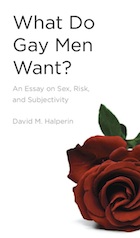
“Compelling, timely, and provocative. The writing is sleek and exhilarating. It doesn’t waste time telling us what it will do or what it has just done—it just does it.”
—Don Kulick, Professor of Anthropology, New York University
How we can talk about sex and risk in the age of barebacking—or condomless sex—without invoking the usual bogus and punitive clichés about gay men’s alleged low self-esteem, lack of self-control, and other psychological “deficits”? Are there queer alternatives to psychology for thinking about the inner life of homosexuality? What Do Gay Men Want? explores some of the possibilities.
Unlike most writers on the topic of gay men and risky sex, David Halperin liberates gay male subjectivity from psychology, demonstrating the insidious ways in which psychology’s defining opposition between the normal and the pathological subjects homosexuality to medical reasoning and revives a whole set of unexamined moral assumptions about “good” sex and “bad” sex.
In particular, Halperin champions neglected traditions of queer thought, including both literary and popular discourses, by drawing on the work of well-known figures like Jean Genet and neglected ones like Marcel Jouhandeau. He shows how the long history of of gay men’s uses of “abjection” can offer an alternative, nonmoralistic model for thinking about gay male subjectivity, something which is urgently needed in the age of barebacking.
Anyone searching for nondisciplinary ways to slow the spread of HIV/AIDS among gay men—or interested in new modes of thinking about gay male subjectivity—should read this book.
David M. Halperin is W. H. Auden Collegiate Professor of the History and Theory of Sexuality, Professor of English, Professor of Women’s Studies, Professor of Comparative Literature, and Adjunct Professor of Classical Studies at the University of Michigan.
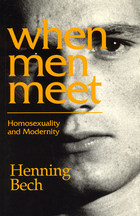
Gay society has persevered, even flourished, in this highly charged urban environment, aestheticizing and sexualizing the spaces, both public and private, where men meet. With profound insight and honesty, Bech details this world, candidly reflecting on sex, friendship, love, and life as manifest in the homosexual form of existence. He convincingly demonstrates that, in the face of modern alienation, successful coping strategies developed by gay men are gradually being adopted by mainstream heterosexual society.
These adaptations are often masked by what Bech calls an "absent homosexuality, " in which sublimated themes of homosexuality and masculine love surface, only to be disavowed in expressions of social anxiety. This "absent homosexuality" acts as a kind of cultural filter, allowing key traits of gay life to be absorbed by the mainstream, while shielding heterosexual males from their own homophobic anxieties. Ultimately, Bech foresees, a postmodern convergence of hetero- and homosexual forms of exisce emergent from this urban landscape and, with it, a new masculine synthesis.
Certain to ignite immediate controversy, When Men Meet offers both a penetrating scholarly analysis of the modern homosexual condition and an unflinching cultural vision of the masculine in transition.
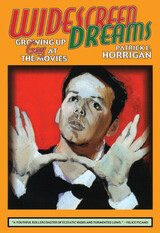
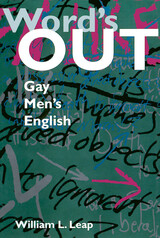
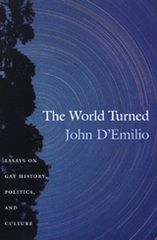
In this collection of essays, D’Emilio brings his historian’s eye to bear on these profound changes in American society, culture, and politics. He explores the career of Bayard Rustin, a civil rights leader and pacifist who was openly gay a generation before almost everyone else; the legacy of radical gay and lesbian liberation; the influence of AIDS activist and writer Larry Kramer; the scapegoating of gays and lesbians by the Christian Right; the gay-gene controversy and the debate over whether people are "born gay"; and the explosion of attention focused on queer families. He illuminates the historical roots of contemporary debates over identity politics and explains why the gay community has become, over the last decade, such a visible part of American life.

READERS
Browse our collection.
PUBLISHERS
See BiblioVault's publisher services.
STUDENT SERVICES
Files for college accessibility offices.
UChicago Accessibility Resources
home | accessibility | search | about | contact us
BiblioVault ® 2001 - 2024
The University of Chicago Press









